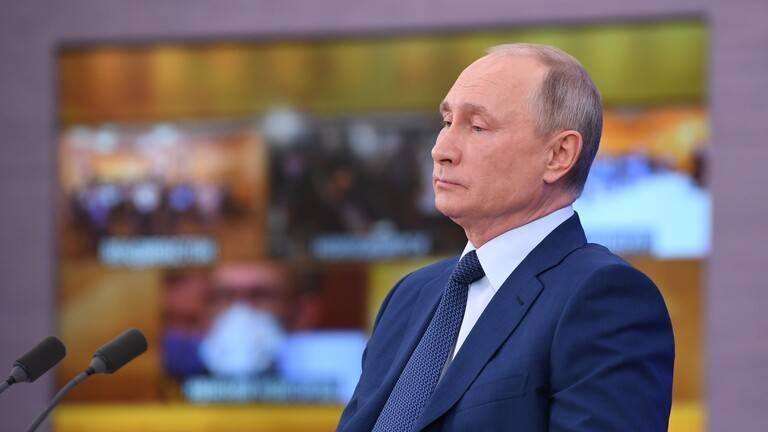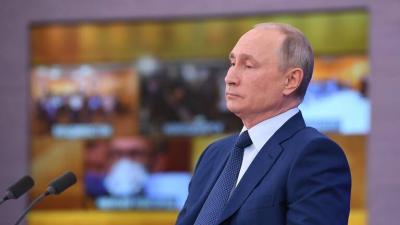Despite being aware of the economic consequences that would befall his country should he decide to intervene militarily in Ukraine, Russian President Vladimir Putin forged ahead with his plan, disregarding the international community and the threats of sanctions that have been pouring in for nearly a month. What is the reason behind this decision? And has the Russian president successfully fortified his country against these sanctions?
Since Putin began amassing over 100,000 troops at the Ukrainian border weeks ago, American and European threats to impose "unprecedented" sanctions on Russia began to emerge. Nevertheless, the president proceeded with his plan, publicly denying any intentions of military intervention.
Putin's boldness raised many questions, particularly regarding the economic aspect, as it appeared that he had "prepared" himself and his country for such sanctions, implementing the "necessary fortifications." Economic expert and host of the "Overhoot" program, Matthew Klein, noted that since the start of the Russian-Ukrainian crisis in 2014, Putin has demonstrated a "brave understanding" of the reality that the West "will not respond to force with force, but with sanctions." This understanding drove Moscow to work over the past eight years to minimize the impact of sanctions.
Klein explained that "the Russian people accepted a decline in living standards and reduced their consumption of imports by more than a quarter," while Russian companies paid off debts owed to foreign creditors, reducing their external debt by a third. The Russian state also tightened its regulations, allowing it to build reserves of gold and foreign currencies. Through these "sacrifices," Russia fortified itself against Western economic weapons, as the Russian central bank possesses a $630 billion fund "for turbulent days."
Even if sanctions were to completely prevent 100% of Russian exports for a year, the country would continue to import at its current rate and maintain foreign exchange reserves. The initial response from U.S. President Joe Biden to Putin's encroachments was to prohibit American investors from purchasing Russian bonds; however, Russia does not need to borrow from Americans, according to the American newspaper "The Washington Post."
The paper questioned how the West prepared for today’s crisis, noting that instead of reducing their dependence on Russian energy supplies, Europeans increased it. In 2013, the European Union imported about 135 billion cubic meters of Russian natural gas; by 2019, the year before the COVID-19 pandemic affected those figures, it imported 166 billion cubic meters—almost a quarter more. Moreover, Russian coal exports to Europe have risen.
Despite Europe's investments in wind and solar energy, Russia's share of the European energy market jumped from 16.5% to 18.5% in the years following the 2014 crisis. This puts the recent European actions in perspective, as Germany suspended the operation of the Russian-German gas pipeline "Nord Stream 2," which was intended to double gas shipments from Russia. Given current import needs, Russia could manage well without the "Nord Stream 2" project, according to the American newspaper.
The United States and its allies also imposed additional sanctions on Russia, targeting Russian parliamentarians and Putin's allies, but they are unlikely to have the desired effect on the Russian president. The sanctions hindered most Russian banks; however, Russian companies wishing to conduct business in the West will find alternative financial partners. Export bans on certain tech products to Russia could specifically impact Moscow, but the effects will be gradual.
"The Washington Post" noted that the sanction likely to have the most significant impact is the exclusion of Russia from the "SWIFT" global payment system, through which banks exchange messages regarding payments. This would significantly complicate trade between the West and Russia and create enough chaos to cause real problems for Putin. Although the Russian central bank is "full" of reserves, those funds will not be particularly useful if not utilized to purchase imports.
For these reasons, Ukraine and the three Baltic states urged the West to remove Russia from the SWIFT system. However, ejecting it from the banking system could spark an energy crisis in Europe, prompting Germany and its neighbors to oppose such a move for now, deeming it an "unacceptable sacrifice."
The American newspaper concluded its report by questioning whether "the West's fragility and Europeans' refusal to accept sacrifice explain why Putin felt emboldened to intervene militarily in Ukraine in the first place? And whether the West should now reconsider its calculations."




